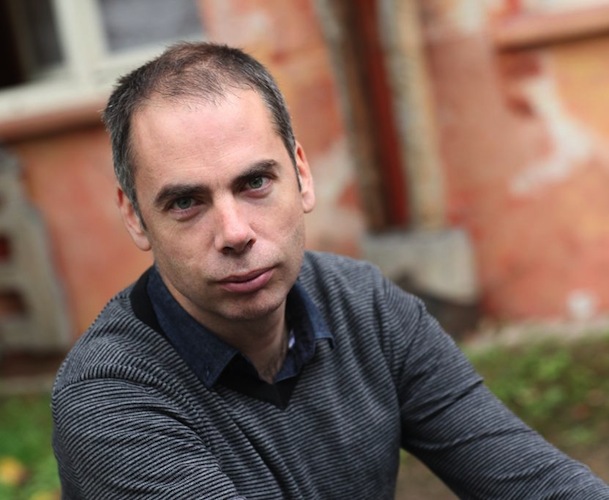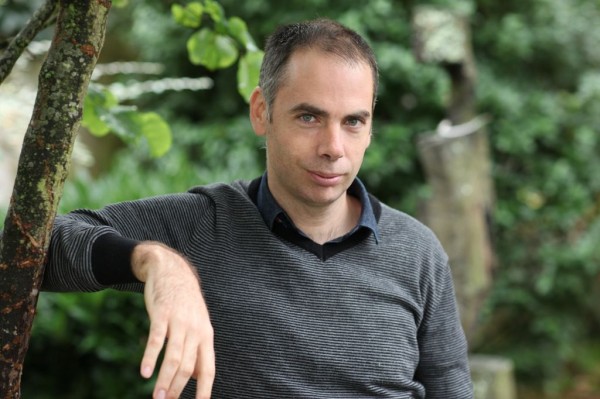Theater Interview: Swiss Playwright Jérôme Richer on Questioning “The Real Meaning of Words”
“Everybody has the power to change the world because we’re a part of it. Even if it’s a really small change, it needs to be done. Writing is my pebble in this path.” – Jérôme Richer

Playwright Jérôme Richer — he believes that writing helps him understand our world and find meaning where there probably isn’t any. Photo: Patrick Favre.
By Ian Thal
Jérôme Richer is a Swiss born playwright from Geneva, the largest city in the French-speaking part of Switzerland. His play, Barks (the French title, Écorces, refers to the skin of a tree and not to a dog’s vocalizations), will be presented in a staged reading at swissnexBoston, part of a network of Swiss Consulates specializing in science, education, and art, in Cambridge, MA on March 18 at 7 p.m.
The play, which in 2008 won Richer the second of his three awards from the Swiss Society of Authors (SSA) and premiered in 2010 at in Geneva’s Le Poche Theatre, tells two intertwined stories. The first revolves around two sisters: one is ground down by stress as she works in an office day-in, day-out. She is apparently supporting not just herself but her sister, who is involved in ineffectual left-wing politics. The outside world intrudes through television news, particularly reports on an on-going war between government forces and an unnamed terrorist insurgency. When not discussing work, family, friends and romance, the sisters debate the political situation from their respective liberal and leftist positions. However, it is unclear whether they are still living in a democracy, or indeed, if they ever were. Political violence has become a day-to-day reality even in the city’s playgrounds, and a computer virus that has infected the office’s network might just as easily be cyber-warfare, not simply a case of vandalism.
The other story is that of a soldier who tells us of his wartime experiences and return to his rural village at the end of his deployment. The war he fights is not the one reported on on television in the other narrative. While he is aware that he and his comrades became party to war crimes and the subsequent cover-up, he is too far down the food chain to know if the orders came from top or from a rogue lieutenant. A conspiracy of silence and a cult of military heroism prevent him from discussing his wartime experiences with anyone else, but he can only defer a difficult moral reckoning for so long.
The reading, the second to be presented as part of the Swiss Stage series, will be directed by Guy Ben-Aharon. The play is receiving its English language premiere in a translation by Kerstin Mercer. The sisters will be played by Miranda Craigwell and Stacy Fischer, while the soldier will be played by Daniel Berger-Jones.
The following interview was conducted by email.
Arts Fuse: You studied law before turning to playwriting. Why have you chosen to express your concern for human rights through drama, rather than through litigation?
Jérôme Richer: Law is not justice. Maybe that’s why I’m a playwright instead of a lawyer. But to be honest, I didn’t really choose to become a playwright. It just happened play after play. When I was younger, a lot of people told me: “In the end you haven’t really changed. Practicing theater and law in a court is quite similar.” But I don’t think so. The truth is that writing helps me to understand our world, it helps me to find meaning where there probably isn’t any.
I always start a new play with a question, with something I don’t understand, and I try to expose this question to the audience. I don’t think in terms of human rights, even if it’s true that my plays always talk about our world and our place in it. Barks is about involvement. What do we do if we don’t like our world ? What is a real involvement for change? The three characters have to define their places in the world. Should they try to be real actors, or stay spectators? It’s easy to say I can’t change anything, I’m too small, I don’t have any power. Everybody has the power to change the world because we’re a part of it. Even if it’s a really small change, it needs to be done. Writing is my pebble in this path.
AF: In the English translation of the script of Barks you state an openness to having some of the soldier’s lines cut. Is such cutting, or preemptively suggesting what sorts of cuts would be acceptable to the playwright, a normal practice in Swiss theater? I ask because in the English language theater, the practice is to perform the script as written unless the playwright or legal representatives give explicit permission to make changes.
Richer: When you give your play to actors, stage director and also translators, you accept [the possibility of] being betrayed. For me, it’s part of the job. A play is like a baby. If you want your kid to grow up and become an adult, you have to let him go, for better or for worse. But you have to take that risk. Even if it’s hard and you might suffer or get angry with what happens to your play. It’s a matter of trust. When I direct my own plays, I always think about the show, not about the play. The play is just a part of it.
At times, the director Jérôme Richer tells the writer Jérôme Richer: “It’s not good. This is not necessary. You have to cut this.” Problems start when others don’t really understand your work and just cut parts of the play because it’s too long, or because they don’t know how to stage it … I have seen Barks several times, but never the entire play. That’s why I remain open: “O.K., maybe you’ll cut my play. But do it the right way.” Because if the cuts are bad you’ll lose the meaning [of the play.] The soldier’s part is written as if we’re inside his head. We feel what he feels. I know it’s a long monologue. That’s why I understand that it could be cut. But not a phrase here, another there. If you cut, cut a real part of his story. But try to be smart. Normally I don’t put that kind of statement [for cutting] before my plays. This is just a reaction to what I saw with Barks.
AF: What was the thought behind the structure of Barks? The narratives of the sisters facing changes in their society and the monologue of the soldier are thematically related, but the characters never meet. Why not write two separate plays?
Richer: The play’s structure is inspired by The Wild Palms [If I Forget Thee, Jerusalem] by William Faulkner. Two interwoven stories which have no apparent common point. I really love this novel. The two stories are like mirrors. Reading one, helps you to understand the second. It’s a bit the same with Barks. The three characters represent three ways to be involved in the world. In the end, the character who is most involved is not the one who we think it is at the beginning of the play. When I was writing the first draft of Barks the possibility of a meeting between the three characters was clearly indicated at the end – when the soldier goes to the capital. But I decided to leave things open. So it’s the spectator’s job to fill in the gaps between the two stories. I think it’s more interesting. It gives each spectator a chance to build his or her own tale.

Dramatist Jérôme Richer — Swiss neutrality is a trademark. It’s a business plan. Photo: Patrick Favre.
AF: Your work is performed throughout Francophone Europe. Some of the political issues you touch upon in Barks are known to citizens in most Western societies: the role of the dissent in a democratic society, the transformation of war and terrorism into media events, violence against women, and near ubiquitous surveillance. Is a play that focuses so much on war received differently in NATO member nations, such as France, Belgium, and Luxembourg, than it is in a famously neutral country like Switzerland?
Richer: Switzerland is not so neutral. I wrote a play about Switzerland four years ago (Une Histoire suisse), in which I said Swiss neutrality is a trademark. It’s a business plan. As one of my friends says, “Switzerland is the eye of the storm.” There’s always something which concerns the world [being debated] here. Look at the peace conference about Syria recently. Living in Switzerland gives you the responsibility to witness what happens around the world, an active witness – especially in Geneva, with all these international organizations. Everyday I read newspapers, observe the conflicting opinions and form my own. Our world is the same. The only difference is our point of views. That’s what I try to do when I write a play: offer a different point of view to the one we normally have.
AF: Much of the story seems to take place only the near future. The two sisters debate between liberal and far-left political positions in a society that may or may not be a democracy We are uncertain about what the terrorists are fighting for. At the same time, when the sisters recount their father’s nightmares, what we hear is eerily similar to the atrocities of the Bosnian and Kosovo Wars of the ’90s. Why choose to be so specific about some details and so vague about others?
Richer: Because I want to put in some signs that everybody can relate to, but also leave space to imagine whatever you want. Until now, every time the play was performed, and in each country it was performed in, people told me that they were able to directly link the ideas in Barks to things happening in their own countries. For example, lately, several people asked me if I was referring to Roma Gypsies and their situation in Europe, whereas I hadn’t thought about them in particular.
Personally, I wrote the play because I was very afraid of the situation in Russia. You have a country that appears to be a democracy, but if you look closely it’s not. Look what is happening these days with the situation in Ukraine, and the last Olympics games in Sochi. Like I’ve always said, democracy is not just having the right to vote. Democracy is something else. An artist’s responsibility is to question the real meaning of words, and that’s what I try to do in Barks.
Ian Thal is a performer and theatre educator specializing in mime, commedia dell’arte, and puppetry, and has been known to act on Boston area stages from time to time, sometimes with Teatro delle Maschere, and on occasion served on productions as a puppetry choreographer or dramaturg. He has performed his one-man show, Arlecchino Am Ravenous, in numerous venues in Massachusetts and Rhode Island, and is currently working on his second full length play; his first, though as-of-yet unproduced, was picketed by a Hamas supporter during a staged reading. Formally the community editor at The Jewish Advocate, he blogs irregularly at the unimaginatively entitled From The Journals of Ian Thal, and writes the “Nothing But Trouble” column for The Clyde Fitch Report

Note: In preparing for this interview, I was allowed to read an early draft of Mercer’s English translation. The version that was used for the reading at swissnexBoston had additional scenes that erased some, but by no means all, of the ambiguities I cited in my introduction.